National Heroes
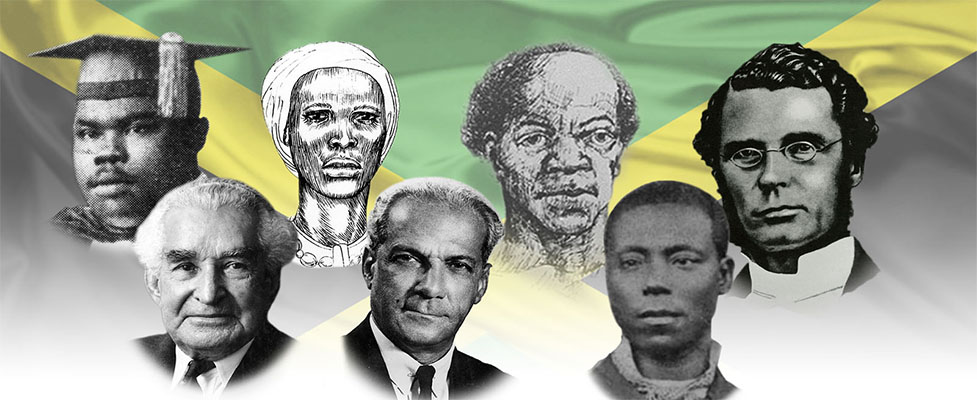
Sir Alexander Bustamante, K.B., O.N.H., Ll.D (Hon.)
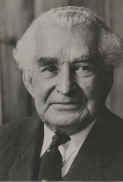 Alexander Bustamante was born William Alexander Clarke, in Blenheim, Hanover, on February 24, 1884. His parents were Robert Clarke, an Irish-descended book-keeper and Mary Clarke, nee Wilson, a small farmer. Poverty ruled out any significant amount of schooling for this young man. Very early, after completing primary school at Cacoon, William started to work as a Clerk under Alexander James, grandfather to P. J. (Percival James) Patterson.
Alexander Bustamante was born William Alexander Clarke, in Blenheim, Hanover, on February 24, 1884. His parents were Robert Clarke, an Irish-descended book-keeper and Mary Clarke, nee Wilson, a small farmer. Poverty ruled out any significant amount of schooling for this young man. Very early, after completing primary school at Cacoon, William started to work as a Clerk under Alexander James, grandfather to P. J. (Percival James) Patterson.
In 1905 he travelled across Latin America and the Mediterranean, beginning at that point his trade union involvement. When he returned to Jamaica in 1934, he had a new name: Alejandro Bustamante. That name, however, was in 1944 changed to Alexander Bustamante by way of deed poll.
Between 1934 and 1938, Sir Alexander Bustamante swamped the press with letters denouncing the social conditions of Jamaica and demanded a better deal for poor and under-privileged people. In 1937, he became treasurer of the Jamaica Workers and Tradesmen’s Union, led by future legislator, Allan George St. Claver Coombs.
In 1938, there were stages of unrest in Kingston as angry workers who began to follow Bustamante took to various strike actions. These incidents culminated into Bustamante, on May 24, being refused permission to stage any meeting in Kingston. Later that same afternoon he and Sir William Grant were arrested and charged with inciting people to unlawful assembly. They were sent to jail without bail and a state of emergency was declared by the Governor.
In September 8, 1940 Bustamante entered detention camp where he spent the next 17 months. On his release he resumed full control of his Union and continued to organize labour. On July 8, 1943, he launched the Jamaica Labour Party (JLP), while holding a meeting at the Ward Theatre in Kingston.
Shortly after the passage of universal adult suffrage in May 1944, Bustamante took the young JLP to the general elections where the Party won 22 of the 32 seats. In 1949, Governor Sir Hugh foot put forward proposals which meant slight advances in self rule. Bustamante accepted these proposals. The JLP won the elections of that year for the second time. By 1953 Bustamante was named Chief Minister.
Sir Alexander Bustamante became the first Prime Minister of Jamaica in 1962. He retired from active politics in 1967 and died on August 6, 1977 at the age of 93.
George William Gordon
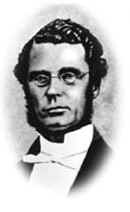 The Rt. Excellent George William Gordon was born near Mavis Bank, in 1820 to Joseph Gordon, a Scottish Planter, and a slave woman. Joseph Gordon saw that his son had special characteristics and from an early age decided to take an interest in his education. George went to live with his godfather, James Daly, in Black River and there completed his education. Gordon was mostly self-educated.
The Rt. Excellent George William Gordon was born near Mavis Bank, in 1820 to Joseph Gordon, a Scottish Planter, and a slave woman. Joseph Gordon saw that his son had special characteristics and from an early age decided to take an interest in his education. George went to live with his godfather, James Daly, in Black River and there completed his education. Gordon was mostly self-educated.
George William Gordon was a large land owner, shop keeper, produce dealer, preacher, politician, social worker and philanthropist. He started out as an Anglican but changed to Baptist having been baptised into the Baptist Society by Rev. J.M. Phillippo, founder of Jamaica’s first Free Village. He later became a leader of the Native Baptist Movement and began building several churches at his own expense, ordained Ministers and was an active evangelist.
In 1843, at the age of 23, Gordon was elected to the House of Assembly for St. Thomas but his public life began about 1844. He entered politics as an advocate for the poverty-stricken Negro peasants. In 1865, when the economic condition of Jamaica was at a new low, Gordon spoke openly on behalf of the poor Negroes and with bitter criticism of Lieutenant Governor Edward Eyre.
During this period of oppression on the part of the Negroes, Paul Bogle was very active in revolting against the system of government. On October 11, Bogle with about 300 men, marched in Morant Bay where the Town Council was in session. There they raided a police station for arms and set the Court House on fire. The Custos, Baron von Ketelhodt, along with fifteen vestrymen was killed. It was from this incident that a warrant was sent out for Gordon’s arrest.
Gordon, having heard that a summon was out for his arrest, turned himself in to Governor Eyre. On October 21, 1865 he was sentenced to death. On October 27, 1960, the Jamaican Parliament named the building where the Parliament Meetings would be kept in honour of Gordon. It was named the George William Gordon House, often called ‘Gordon House’ for short. After independence Gordon was given the nation’s highest honor, Order of National Hero.
Marcus Mosiah Garvey
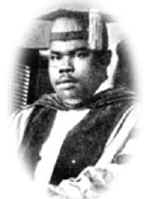 Marcus Garvey, the last of eleven children, was born in St. Ann’s Bay on August 17, 1887. He is said to have been a descendant of the Maroons.
Marcus Garvey, the last of eleven children, was born in St. Ann’s Bay on August 17, 1887. He is said to have been a descendant of the Maroons.
In his youth, Garvey moved to Kingston where he worked at the Government Printing Office. He resigned this job in 1910 to publish a small paper called ‘The Watchman’. This was regarded as the turning point in his career.
In 1914, he started the United Negro Improvement Association (UNIA). The UNIA encouraged self government for black people worldwide, self help, economic projects, protest against racial discrimination, and cultural activities.
In 1916, Garvey went to United States where he preached his doctrine of freedom to the oppressed blacks. He visited thirty-eight (38) states in one year and in a few months there were more than thirty branches of the UNIA across the United States. Other branches existed in Africa and the West Indies.
By 1921 he was the leader of the largest black organization in history, which at its highest had 6 to 11 million followers. At that time there were 859 branches of the UNIA in over 30 countries.
Between 1922 and 1927, Garvey’s life had taken a turn. In 1922 he ran into financial difficulties and was charged with fraud. He denied the charges but was found guilty and fined $1000 and sentenced to five years in jail. During his incarceration, his wife, Amy Jacques, worked for him, continuing the work of the UNIA. In 1925 Garvey appealed the verdict but it was dismissed. Imprisoned in Atlanta, he spent nearly three years and was subssequently deported to Jamaica.
Back in Jamaica, he continued to hold public meetings and other cultural activities in Edelweiss Park. But changes did not come easily and so he left for England in1935. There, he remained active until January 1940 when he suffered a stroke. After suffering a second stroke he died in June 1940. He was embalmed and buried in Kendal Green Cemetery, London. In 1964 his body was exhumed, brought home to Jamaica, and reburied in the National Heroes Park.
Marcus Mosiah Garvey, Jamaica’s first National Hero, has been recognised as the first black man to awaken the dignity of the black race in Jamaica, North America and Africa.
Nanny of the Maroons
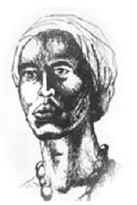 It is not certain whether Nanny was born in Jamaica or in Africa. She was of Ashante origin and was the sister of Cudjoe, the leader of the Trelawny Town Maroons and Quao. Nanny was not a slave. She was married but had no children. Her full responsibility was for the welfare of the women and children in the community; even the King had to call upon her for advice, especially those relating to women.
It is not certain whether Nanny was born in Jamaica or in Africa. She was of Ashante origin and was the sister of Cudjoe, the leader of the Trelawny Town Maroons and Quao. Nanny was not a slave. She was married but had no children. Her full responsibility was for the welfare of the women and children in the community; even the King had to call upon her for advice, especially those relating to women.
Nanny, the spiritual leader of the ‘Windward Maroons’ at Nanny Town, Portland, was known to be an outstanding military leader. In her lifetime and after, she was seen as a symbol of unity and strength for her people during their time of crisis.
It is believed that Nanny died in the 1750s. Her remains were put to rest at Bump Grave in Moore Town, Portland, (New Nanny Town).
Norman Manley
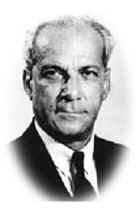 Norman Manley was born at Roxborough, Manchester on July 4, 1893 to Thomas Albert Samuel Manley, a planter and producer, and Margaret Ann Shearer, a small pen-keeper from Blenheim, Hanover. Manley was one of four children. He had two sisters, Vera and Muriel, and one Brother Roy, who was killed in the first World War. At age six his father died, leaving the family with limited resources. His mother then moved to Belmont, St. Catherine.
Norman Manley was born at Roxborough, Manchester on July 4, 1893 to Thomas Albert Samuel Manley, a planter and producer, and Margaret Ann Shearer, a small pen-keeper from Blenheim, Hanover. Manley was one of four children. He had two sisters, Vera and Muriel, and one Brother Roy, who was killed in the first World War. At age six his father died, leaving the family with limited resources. His mother then moved to Belmont, St. Catherine.
Manley was a brilliant scholar. He was also an athlete, a soldier in World War I and a lawyer. In September 1938, he founded the People’s National Party (PNP) and was elected President until his retirement 31 years later. As Chief Minister and later Premier, he moved the country rapidly towards internal self-government in July 1959 and independence, August 1962.
Manley died on September 2, 1969 at age 76.
Paul Bogle
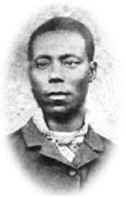 It was believed that Paul Bogle was born free about 1822. He was a firm political adherent of George William Gordon who made him a Deacon. Bogle lived in Stony Gut but also had another house in Spring Garden. He was not a poor man; he also had 500 acres at Dunrobin.
It was believed that Paul Bogle was born free about 1822. He was a firm political adherent of George William Gordon who made him a Deacon. Bogle lived in Stony Gut but also had another house in Spring Garden. He was not a poor man; he also had 500 acres at Dunrobin.
In 1865, the economic situation in Jamaica began to worsen. There were increases in unemployment and taxes, but a reduction in wages. Gordon had appointed Bogle the leader of the group he had chosen to take their complaints to the Governor.
Bogle, with the support of his brother Moses, was holding private meetings without Gordon’s knowledge. He and Moses, along with 200 men, marched to Morant Bay to watch a trial at the Court. A man shouted out to the Court and the police tried to arrest him. Bogle and his men saved the man from the police and they made good their escape. The following day in Stony Gut, they heard that a warrant was out for 28 of them. The police tried to arrest Paul Bogle but his followers fought them off.
On Wednesday, October 11, Bogle and about 300 men marched into Morant Bay and raided the police station and took some old guns. They then marched to the Court House where the Custos was having a meeting. They killed the Custos, Baron von Ketelhodt and fifteen vestrymen and set 51 prisoners free.
The parish was put under Martial Law on October 13, and General Forbes-Jackson was dispatched from Kingston with orders to crush the rebellion. The soldiers killed hundreds of innocent people. Others were beaten, shot and hanged. Stony Gut was burnt out. Bogle and his men, however, had already fled to the bushes. They were hunted throughout the day by the Maroons and the Soldiers as a $400 reward was out for Bogle’s capture. He was captured by the Portland Maroons on the same day that George William Gordon was hanged.
Bogle’s trial was short. He was found guilty and sentence to death. He and his brother Moses were hanged from the burnt out Court House on October 24, 1865.
 Born in 1801 in Montego Bay, Samuel Sharpe grew up as a house slave. Unlike many slaves he was literate, having been educated by his master who was also named Samuel Sharpe. His master treated him very well and allowed him certain privileges. He thus became his master’s right-hand man.
Born in 1801 in Montego Bay, Samuel Sharpe grew up as a house slave. Unlike many slaves he was literate, having been educated by his master who was also named Samuel Sharpe. His master treated him very well and allowed him certain privileges. He thus became his master’s right-hand man.
Samuel Sharpe had special responsibilities; one of which was to take the jobbing slaves -those hired out to others- to work. While carrying out his daily duties he became disgruntled with the way in which slaves were treated, he himself included. He wanted to be free.
Sam Sharpe was the main instigator of the Slave Rebellion which began on Kensington Estate in St. James and as a result he was executed in the Montego Bay market place on May 23, 1832. It was this rebellion, however, that lead to the abolition of slavery in Jamaica. Sharpe was buried in the sands of the Montego Bay Harbour. His remains were later exhumed and reburied beneath the pulpit at Burchell Baptist Church.
